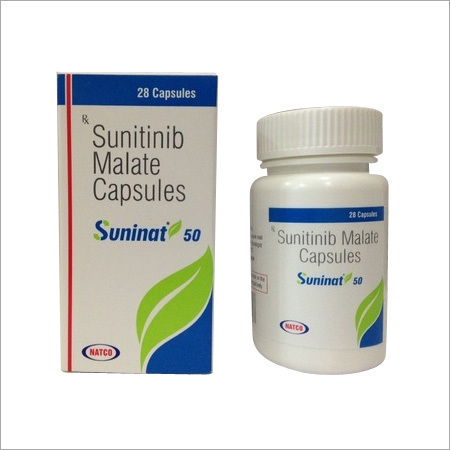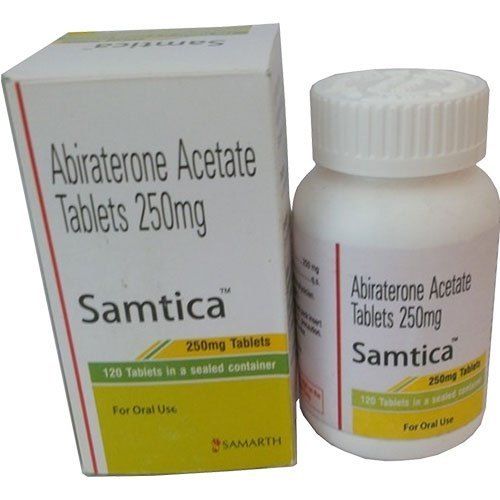
Suninat 50 Mg
Product Details:
- Origin India
- Salt Composition Sunitinib malate
- Indication kidney cancer and gastrointestinal stromal tumor
- Dosage Form Capsules
- Feature Other
- Ingredients Other
- Fermentation Smell Normal Smell
- Click to view more
Suninat 50 Mg Price And Quantity
- 13900 INR/Piece
- 10000 Bottle
Suninat 50 Mg Product Specifications
- kidney cancer and gastrointestinal stromal tumor
- Capsules
- Other
- Sunitinib malate
- India
- 12 Months
- Normal Smell
- Room Temperature
- Other
Suninat 50 Mg Trade Information
- Letter of Credit (L/C) Days after Acceptance (DA) Cash in Advance (CID) Cheque Cash Advance (CA)
- Asia Eastern Europe Africa South America Australia Central America Middle East Western Europe North America
- All India
Product Description
A drug called Suninat 50 mg contains sunitinib, a tyrosine kinase inhibitor used to treat specific cancers. It is recommended for patients with pancreatic neuroendocrine tumours (pNET), advanced renal cell carcinoma (renal cell carcinoma), and gastrointestinal stromal tumours (GIST). Sunitinib functions by preventing particular proteins from growing tumours and causing angiogenesis (blood vessel creation). The medication is offered as tablets to be taken orally. In patients with these particular cancer types, suninat 50 mg is beneficial in decreasing the growth of cancer and increasing overall survival rates. But it could also result in adverse reactions like weariness, diarrhoea, skin rashes, hypertension, and haematological issues. During the course of their Suninat 50 mg medication, patients should be regularly watched.
Suninat 50 Mg (sunitinib) has the following features and advantages:
Features:
1. Sunitinib, a tyrosine kinase inhibitor found in Suninat 50 mg, selectively targets and inhibits certain enzymes involved in tumour growth and angiogenesis.
2. Suninat is formulated as an oral tablet, making it simple and convenient to administer. This makes it more patient-friendly than intravenous therapies.
3. Suninat 50 mg is prescribed to treat a variety of cancers, including pancreatic neuroendocrine tumours (pNET), gastrointestinal stromal tumours (GIST), and advanced kidney cancer (renal cell carcinoma).
Benefits:
1. Cancer Treatment: Patients with advanced kidney cancer, GIST, and pNET can benefit from the use of suninat 50 mg. As a result, overall survival rates and quality of life are enhanced by helping to slow down tumour growth and spread.
2. Targeted Therapy: Suninat, a tyrosine kinase inhibitor, selectively kills cancer cells and the blood arteries that feed them while causing the least amount of harm to healthy cells and possibly minimising adverse effects.
3. Prolonged Progression-Free Survival: Studies have indicated that suninat prolongs the period before cancer progresses, providing patients longer before their condition gets worse.
4. Delayed Tumour formation: Suninat can reduce the size of tumours or stop them from growing larger by blocking the enzymes necessary for tumour formation.
5. Treatment Convenience: Suninat is available as oral tablets that patients can take at home, avoiding the need for frequent hospital visits.
6. Suninat has the potential to be used in combination with other cancer therapies, increasing their efficacy and giving patients more treatment alternatives.
It's critical for patients to fully grasp the dangers and potential side effects of Suninat 50 mg and to properly go through treatment alternatives with their doctor. The greatest outcomes during cancer therapy with Suninat depend on consistent monitoring and communication with the medical staff.
Suninat 50 Mg (sunitinib) Uses Include:
1. Suninat 50 mg is used to treat advanced kidney cancer (renal cell carcinoma) that has spread to other body parts or that cannot be surgically removed.
2. Suninat is a drug that is prescribed to treat gastrointestinal stromal tumours (GIST), a form of cancer that appears in the digestive tract.
3. Suninat 50 mg is prescribed for the treatment of advanced or metastatic pancreatic neuroendocrine tumours (pNET).
Suninat 50 Mg (sunitinib) Side Effects:
1. Weakness and fatigue: Suninat may make some people feel weak and weary.
2. Patients who take Suninat may develop diarrhoea as a side effect.
3. Skin Reactions: Itching, dryness, or discolouration of the skin are possible.
4. Hypertension: Suninat may cause some patients to have high blood pressure readings.
5. Gastrointestinal Disturbances: Potential adverse effects include nausea, vomiting, and appetite loss.
6. Skin Reaction on the Hands and Feet: Some patients may suffer soreness, swelling, and redness on the palms and soles of their hands and feet.
7. Haematological Disorders: Suninat may cause anaemia, thrombocytopenia (low platelet count), or neutropenia (low white blood cell count) through affecting blood cell counts.
8. Hypothyroidism: Sunitinib may result in a thyroid gland that is underactive, which can produce symptoms like weariness and weight gain.
9. Rarely, Suninat may cause liver toxicity, which can sometimes be quite serious.
10. Heart Issues: Suninat may cause heart-related side effects in some people, such as heart failure or arrhythmias.
11. Impaired Wound Healing: Suninat may hinder the healing of wounds, especially after surgery.
Any severe or enduring side effects should be immediately reported by patients to their healthcare physician. Suninat 50 mg should only be administered under the direction of a licenced healthcare provider, and patients should be closely watched while undergoing treatment.

Price:
- 50
- 100
- 200
- 250
- 500
- 1000+

 English
English Spanish
Spanish French
French German
German Italian
Italian Chinese (Simplified)
Chinese (Simplified) Japanese
Japanese Korean
Korean Arabic
Arabic Portuguese
Portuguese




 Call Me Free
Call Me Free
